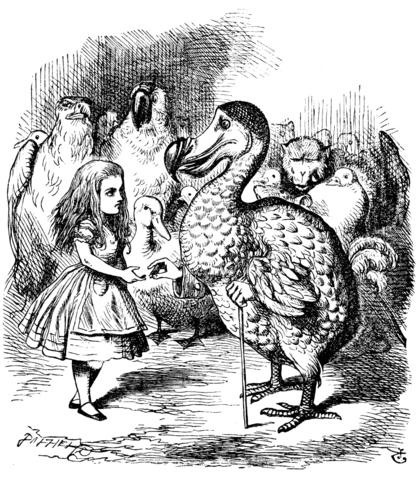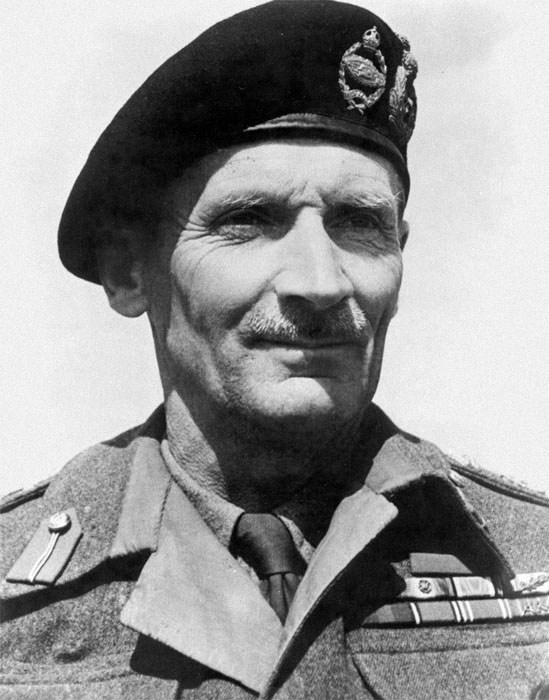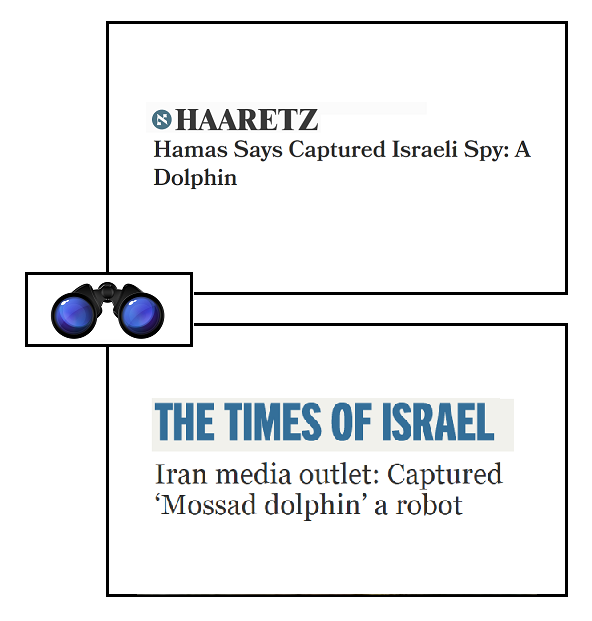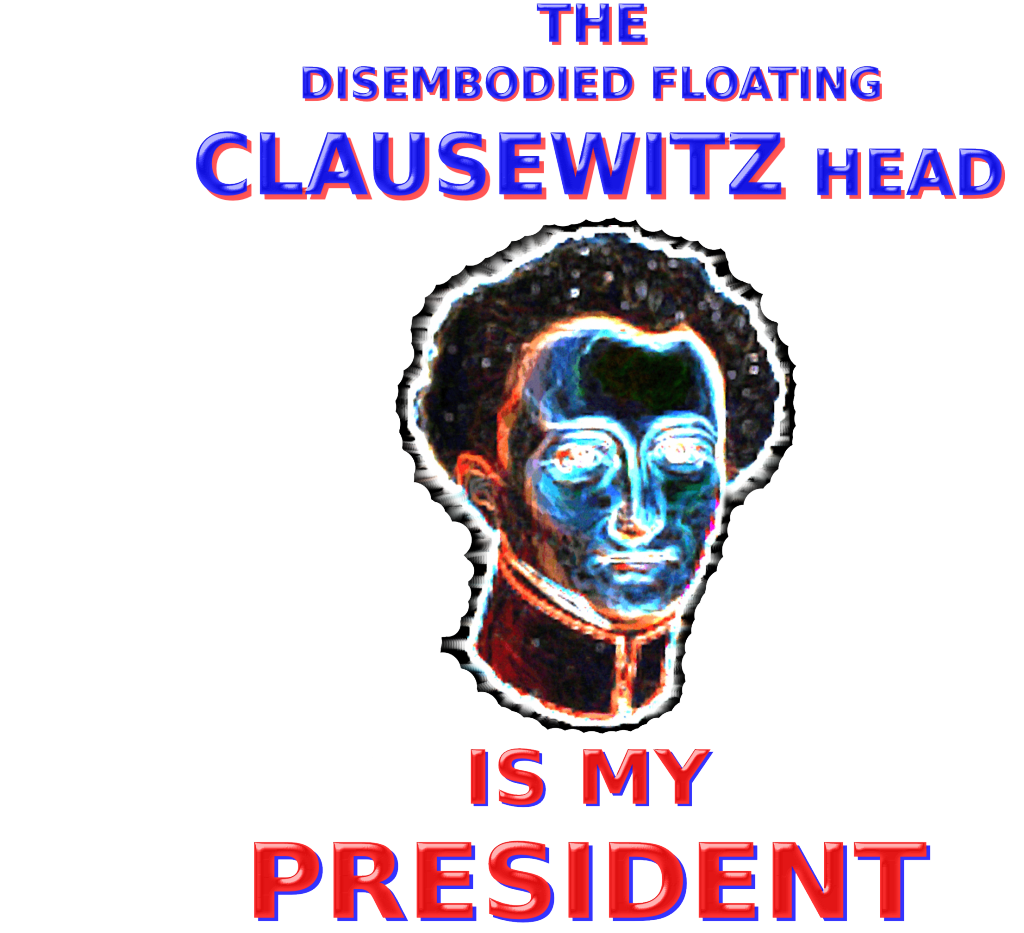Archive for the ‘fog of war’ Category
“I work for crazy too.”, Here Clausewitz explains: Part II: Hu’s on first?
Saturday, June 6th, 2015Let’s go back to June 5, 1989, to Peking, to this very spot. On arrival, recovering from a bad case of time lag, we notice Clausewitz’s disembodied floating head circling the scene. No one else see’s the Clausewitz head. A sensible disembodied floating head, the Clausewitz head has selectively cloaked itself in invisibility so it doesn’t draw the fire of the People’s Liberation Army, who were, understandably, jittery that day. Seeing the disembodied floating head of a long dead and much reviled Prussian military theorist is the sort of thing that would make a jumpy PLA peasant conscript fire indiscriminately into the middle of a major city. His superiors wouldn’t be amused. People’s Liberation Ammunition is supposed to be expended on unarmed civilians, not gwailo disembodied floating heads. The debriefing of this particular tank crew would be tense. Their final defense may come down to Marx, Lenin, and Mao’s favorable citations of the original bearer of this particular disembodied floating head.
Whether Tank Man would flee if he too could see the Clausewitz head is unknowable. Our only clue is Tank Man’s demonstrated courage in choosing to stand in front of a column of Type 59 tanks without the immediate assistance of his very own M-1A2 Abrams tank. If he could see the Clausewitz head, he might realize that, since he is neither a simpering Basil Liddell Hart, a sinister kitten-hating Martin Van Creveld, or some other purveyor of snake oil, he has nothing to fear from the Clausewitz head. In any event, none of the other participants in this historical vignette can see the Clausewitz head.
The play’s the thing but blood is its trumpet
Wednesday, March 5th, 2014[resuscitated by Lynn C. Rees]
A book review of Max Hastings’ book Winston’s War: Churchill, 1940-1945:
John F. Kennedy said that in 1940 Churchill mobilized the English language and sent it to battle. But that was the problem. Churchill saw war in rhetorical terms, as pageantry and drama, as though eloquence alone were enough.
At the beginning of the war Evelyn Waugh joined a new unit of the Royal Marines, for which Churchill, when he was first lord of the Admiralty, was responsible. As Waugh dryly put it in a letter, he was “now in a very fine force which Winston is raising in order to provide himself with material for his broadcasts.” Rhetorical was what these forces and their derring-do often were.
What Churchill quite failed to grasp was the importance of sheer mass in modern war, as opposed to “The British Way in Warfare.” That was the title of a book published in November 1942 by Capt. B. H. Liddell Hart, the self-appointed, and sometimes self-important, military oracle, in which he returned to his pet theme: England’s greatness had formerly rested on indirect attack and limited aims, a policy tragically forgotten in 1914.
In a fascinating review that Hastings might have quoted, George Orwell summarized this “traditional strategy” favored by Hart, not to say by Churchill: “You attack your enemy chiefly by means of blockade, privateering and seaborne ‘commando’ raids. You avoid raising a mass army and leave the land fighting as far as possible to continental allies.” What few people seemed to have noticed, Orwell went on, was that for the past three years we had “waged the kind of war that Captain Liddell Hart advocated,” and yet neither he “nor anyone else would argue that this war has gone well for us.”
I once leafed through Atkinson’s An Army at Dawn at a local bookstore. I put it down in disgust: Atkinson’s introduction fawned over the World War II-era British Army. Even by our low national standards, glorification of the World War II-era British Army is a silly exercise in American self-loathing. The British Army started the war badly, fought the war badly, and ended the war badly. Its leaders occasionally rose to adequacy but were almost uniformly terrible. Two British generals, Harold Alexander and His Serene Highness Prince Louis Francis Albert Victor Nicholas “Chainsaw” von Battenberg Mountbatten were selected for theater command more for their agreeable temperament than their military talent. The one World War II-era British general of any stature among the Great Captains of History was frowned upon by Churchill and exiled to a military backwater.
While American military leaders insisted on a cross-channel invasion in 1942 and 1943 (which would have failed) and incompetent Soviet military leadership killed uncounted millions of Russian soldiers and civilians, they were right on the big picture: the war in Europe would not end until enough military force was brought to bear on the North European Plain to break the Wehrmacht and destroy the Nazi regime.
Churchill’s indirect approach fantasy was built on the proposition that penny packets of American Allied forces landed in small isolated pockets in Italy or the Balkans would somehow drain away significant amounts of German strength. This drainage would occur despite how indirectly approaching Germany from its “soft” Mediterranean underbelly involved directly and repeatedly banging the American’s Allies’ head against the southern face of the Alps. When Italy tried this same indirection during World War I, it worked so well that they went on to make ten sequels.
In contrast, Churchill vehemently opposed an Allied landing in Provence, the Mediterranean gateway to the only significant gap in the mountain ranges guarding southern Europe. He must have instinctively found its strategic rationality offensive. The Allied landing there in 1944, two months after the Normandy landings, was an outstanding victory (as Churchill, to his credit, gracefully admitted).
Churchill was a brilliant scribbler and weaver of narrative but a mediocre to utterly pathetic strategist. While he rightly recognized the core need for an energizing plot line in underscoring any successful war effort, this was not a unique insight or skill among Allied leaders: FDR and Stalin were also masters of story telling. Consider the opening to Stalin’s famous (in Russia) July 3rd, 1941 speech:
Comrades! Citizens! Brothers and sisters! Men of our army and navy! I am addressing you, my friends!
This is not “never surrender” “finest hour” “owed by so many to so few” “blood, toil, tears, and sweat” inspirational to Western ears, but it was the first and last time Stalin’s rhetoric was personal. Starved for love from their Little Father for so long, Soviet subjects citizens responded to Stalin’s genocidal terror wooden brand of charisma with alacrity. The difference between Churchill and the other Big Two was that FDR and Stalin remembered that, while a strong strategic story is crucial in war, it is not sufficient unto itself. The Carl observes:
Essentially war is fighting, for fighting is the only effective principle in the manifold activities generally designated as war. Fighting, in turn, is a trial of moral and physical forces through the medium of the latter. Naturally moral strength must not be excluded, for psychological forces exert a decisive influence on the elements involved in war.
And reiterates:
Kind-hearted people might of course think there was some ingenious way to disarm or defeat an enemy without too much bloodshed, and might imagine this is the true goal of the art of war. Pleasant as it sounds, it is a fallacy that must be exposed: war is such a dangerous business that the mistakes that come from kindness are the very worst. The maximum use of force is in no way incompatible with the simultaneous use of the intellect. If one side uses force without compunction, undeterred by the bloodshed it involves, while the other side refrains, the first will gain the upper hand.
The rationale behind Churchill, Brooke, Fuller, Liddell Hart, and Bernard Law Montgomery’s desire to limit British casualties is understandable: there wasn’t enough white Britons to fight the way the Russians and Americans fought. But the message of war is nothing without its medium: bloodshed. Liddell Hart and fellow advocates of “the British way of warfare” willfully ignored this. Both Fuller and Liddell Hart conjured up an undead and unholy Clausewitz roaming the Somme and Passchendaele battlefields, killing off the best British military talent of the next generation while whispering sweet nothings in Field Marshal Haig’s ear. On Flanders field, the “Mahdi of Mass” sucked the lifeblood out of the British Empire. From where they stood, Clausewitz, a lidless Prussian eye wreathed in flames, could even be the original model for J.R.R. Tolkien’s Sauron (Tolkien fought at the Somme).
But Britain, as Orwell points out, was saturated in Liddell Hart thought. And how did this mindset work in practice?
Miserably.
Churchill’s obsession with striking on the periphery following Liddell Hart’s indirect prescription and “the British Way of Warfare” condemned British soldiers to slaughter in small, inconsequential driblets like Greece, Dieppe, or the Dodecanese. While this may be more emotionally tolerable to the large consequential massacres of World War I, it doesn’t bring you any closer to the Ruhr and so it doesn’t bring you any closer to victory.
The British Army didn’t display much flair for the indirect approach either. The most successful British-only operation of the European theater, El Alamein, was a methodical set-piece battle focused more on boring attrition than splendid maneuver. Eighth Army’s pursuit of the remnants of Panzerarmee Afrika afterward was more dogged than dashing. Slim’s 1945 campaign in Burma was an exception to this general mediocrity but then Slim was exceptional among British commanders in not being a mediocre general. When the British Army really tried something like the indirect approach, the result was usually more Arnhem than Mandalay. A British general could be adequate when you drew a line on a map and ordered them to hold it. Scenarios that relied on maneuver and initiative were doomed.
Material trumps spirit. Material wedded to spirit trumps spirit doubly. The Huns and Japanese emphasized fighting spirit to make up for deficiencies in material. They portrayed Americans as soft paper tigers who relied on fighting the Materialschlacht (battle of material). Yet this propaganda was simplistic, as befitting a Fascist regime. America effectively wed narrative to mass in World War II. FDR, for all his flaws, was a great showman. He peddled an American story that sold well at home, at the front, and overseas.
If FDR had relied on rhetoric or clever indirect approaches alone, as Churchill advocated, the Russians would have ended up in Paris. War is more than shock and awe and the sowing of confusion and disorder in enemy ranks. It is more than a gentle wooing of enemy populations with compelling stories. Confusion wears off and love is fickle but death (from a strictly military perspective) is forever. A critical part of war is making the other fellow die for his country, tribe, or non-state actors guild or, at least, persuasively convincing him that there’s a strong possibility thereof.
If you ignore the physical forces in war, you get the opening phase of Operation Iraqi Freedom. If you ignore the moral forces in war, you get Vietnam. In Vietnam, the U.S. Army killed Vietnamese a plenty but lost the contest of moral forces (the North Vietnamese had the good sense to liquidate their media lackeys and hippies when they got uppity). In the opening phase of OIF, there was a lot of emphasis on psychological effect but not enough emphasis put on physically locking down Iraqi forces. Nathan Bedford Forrest, a master of shock, speed, and maneuver, had two parts to his strategy. A Churchillian war of eloquence may deliver the first part, put the scare into ’em, but it may fail to deliver the second: and keep it on. Iraqi forces certainly fled and eventually disappeared but no control was exercised over these wandering soldiers. They were allowed to wander off. Large parts of the country were left un-Americaned for too long. The scare was put into them but it wasn’t kept on. Eventually shock and awe, however much there really was, wore off and it was open season on American soldiers. Contrast this with Germany and Japan after World War II. The scare was put on and if it wore off, there were still American troops with guns patrolling the streets to put it back on. And, if the Americans annoyed you, they could always go home and leave you to the tender mercies of the Russians.
The implicit threat of Muscovite hordes may have done more to keep the fear on the Germans and Japanese than anything the Americans did. After all, the Russians had the most effective mix of narrative and mass of the second World War. Marxist-Leninist-Stalinism had the strategic advantage of integrating Clausewitz at its inception. This helped Stalin demonstrate a masterful grasp of mixing politicking and warfare under the direction of politics. If people thought Americans could be bled into disengagement, they were under no illusions that they could do the same to the Russians. If the Russians came, they would break you. They had the narrative of communism to inspire fellow travelers and useful idiots (the first to go into the GULAG when Soviet troops actually arrived) and they had a well-earned reputation for brutality to inspire everyone else. This narrative was backed by masses of tanks, artillery, planes, trains, automobiles, millions of Russian soldiers, and generals who weren’t afraid to use them to the last man.
If today’s Americans need a Churchill to seek strategic inspiration from, especially in wedding story with mass, they’ll have more luck with John Churchill than his loquacious great-great-great-great grandson.
Strategy, Winston Churchill, and the power of positive thinking
Monday, October 7th, 2013[by Lynn C. Rees]
Winston Churchill had terrible parents.
Randolph Churchill was a Tory meteor who shot brightly across British politics only to die of syphilitic inanity by age 45. The elder Churchill’s attitude towards his firstborn was cold and dismissive: while he may never have said anything as chilly as Arthur Wellesley’s mother (“my ugly boy Arthur was food for powder and nothing more”), Randolph Churchill agreed with Ann Wesley’s sentiments enough to pack young Winston off to Sandhurst to become cannon fodder.

Randolph Churchill
Jennie Jerome was an American heiress who spent most of her time pursuing (and being pursued by) high London society. Winning Mum of the Year was item 113 on her 100 item todo list. When his mother finally allowed him to develop a personal relationship with her deep into his twenties, Churchill described their relationship as more brother-sister than mother-son.

Jennie Jerome Churchill
Churchill reacted to his parental deep freeze by idealizing mum and dad. If the beacon of maternal love in Churchill’s memoirs will never be mistaken for the real Jennie Jerome Churchill, Churchill ignored the incongruity. If the romanticized father he worshipped bore only a slight resemblance to the real Randolph Churchill, Churchill’s desire for the approval of this shade conjured by his own vast imagination was enough to spur him to great deeds. Asked later in life what his greatest regret was, Churchill surprised one interviewer by wistfully wishing that Randolph Churchill had lived to see his son’s career success. Churchill even had a dream starring Randolph Churchill in 1947, 50 years after his father’s died. His father’s ghost appeared and interrogated Churchill about happenings in the world since his death. Churchill got to most of early 20th century history but, tellingly, he didn’t have enough time to tell his father of his key own role in those events before the dream ended.
Churchill’s eager over-imaginings not only gave him wonderful parents but other equally sustaining fictions. Churchill believed in (and almost willed into existence) a United Kingdom of Great Britain and Ireland that was as strong and vital in the early 20th century as it was under Pitt or Temple. In reality, the Britain of Churchill’s time was a run-down and dispirited shadow of glory, more fixated on bread and butter at home than dash and destiny abroad. In Churchill’s imagination, the Britain of 1940 was a Tyrannosaur among sheep. In reality, it was a dodo among eagles and bears.

The United Kingdom of Great Britain and Ireland
Lawrence Freedman has argued that Churchill’s strategy in 1940-1941 is vastly different from the strategy contemporary strategic studies holds up as an ideal. His strategy was the triumph of hope over experience, one of the great fantasy spectaculars of the 20th century. His soldiers were tired, his people were dispirited, his aircraft carriers carried biplanes, his generals were mulish, and his empire was restive. The only anchors in reality for Churchill’s strategy were the inability of Nazis to march over or part the English Channel and American reluctance to see faltering Britain replaced by revanchist Germany. All else was theater.

Mule
Churchill won the Nobel Prize for literature in 1953. This is revealing: Churchill was a better writer than orthodox strategist. His delusions were as larger than life as his correct notions were. But Churchill’s resort to grand narrative was far more successful than strategic orthodoxy can capture or comprehend. More often than not, the strength of conviction behind a strategy’s more tenuous elements wins more in war than its tenuous connection to reality warrants.
Churchill’s strategy in childhood consisted of holding on to a series of deluded and contradictory beliefs about his parents in the hope that something good would turn up. Churchill’s strategy in World War II consisted of holding on to a series of deluded and contradictory beliefs about the British Empire in the hope that something would turn up. Self-appointed strategic professionals often diagnose a possible strategic outcome as impossible only to be confounded when someone clings to impossibility until the possible turns up. Mere clinging has a long and distinguished record of unmasking the impossible as only the improbable under the wrong circumstances and the all too probable under the right circumstances.
Bomb Syria?
Thursday, August 29th, 2013
[by Mark Safranski a.k.a. “zen“]
There is much ado about a prospective Western (i.e. American) aerial campaign to bomb the Iranian allied Alawite-Baathist dictatorship Syria over use of chemical weapons against primarily al Qaida allied Sunni Islamist extremist rebels.
To what end or how that end will be brought about by a surgical use of American air power, aided by token French and British contributions, well, no one is quite sure.
The driving insider force behind this astrategic call to arms are Susan Rice, Samantha Power and Anne-Marie Slaughter, the three Furies of R2P. Slaughter writes on military intervention in Syria with her usual combination of moral certainty and operational magical thinking here. Rice angrily pontificates here while an unusually muted UN Ambassador Samantha Power just tweeted about it while on vacation from the emergency UN Security Council meeting on, uh, Syria.
The strategic argument about Syria is not about the normative qualities of the Assad regime, which is anti-American, brutal, terrorist supporting and fascistic. Or that the regime is committing atrocities. It is. It is about what political objective, if any, the use of military force against Syria can accomplish at what cost and with what probable outcomes. At a grand strategic level, there are also questions about how military intervention in Syria will impact great power relations and the shaping of international law.
I suspect many R2P advocates like Slaughter, Rice and Power are attracted to the idea of bombing Syria partly to garner a precedent to support doing similar things in the future, whether or not it has any positive effect on the Syrian civil war. That however, if true, is an extremely poor reason for military intervention anywhere. If bombing had some hope of changing the behavior of the Syrian regime or replacing it with something better, I would warm to the prospect but where is the evidence that is a likely outcome? Consider:
The Syrian rebels include armed groups as violent, lawless and squalid as the Assad regime. You know, the Beheading community of the third jihad international, with fringe support from the occasional cannibal commandos. If these Islamist lunatics come to power in Damascus they will cheerfully engage in ghastly pogroms of mass murder and torture that will make Assad’s goons look like the British Raj at tea time.
The Assad regime and the Alawite minority from whence it originates have their backs to the wall in a conflict that determines if they continue to rule Syria or are exterminated. Having no margin for maneuver or concession, America bombing them is irrelevant to whether in their calculus they can stop fighting their local enemies. The whole point of combining the threat of force with diplomacy – allegedly the reason given for bombing Syria – is to be able to make Assad an offer that he can’t refuse and not a threat that the Alawites can’t accept. Then, while blustering loudly and ominously we undercut our own bellicose posturing and announce that regime change was off the table. WTF? Really?
The President should fire this unholy crew of incompetents and intellectual poseurs and hire some real foreign policy advisers with at least an undergraduate level grasp of how diplomacy, strategy and war have worked for the past 2000 years.
Failing that, a few poker players who can bluff without showing the entire table their cards.





